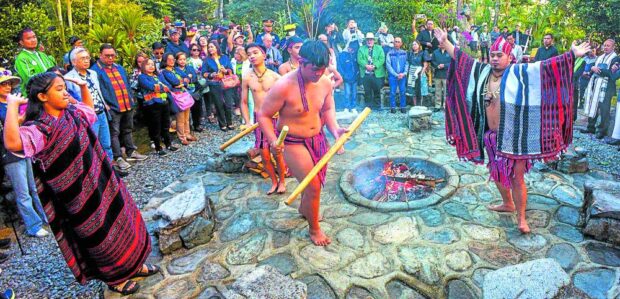Bill removing NCIP power over ancestral titles opposed

INDIGENOUS ROOTS Baguio was built by the American colonial government in the early 1900s but its roots are Ibaloy, whose traditions are the foundation of its annual flower festival. The city’s
original settlers are opposing a proposed measure that will remove the power of the National Commission on Indigenous Peoples to issue ancestral land titles. —NEIL CLARK ONGCHANGCO
BAGUIO CITY—Members of the indigenous peoples’ (IP) group Ibaloy in this city are opposing a bill that removes from the National Commission on Indigenous Peoples (NCIP) its key power to title ancestral lands, according to a draft city council resolution filed on Monday by its Indigenous Peoples Mandatory Representative (IPMR).
House Bill (HB) No. 9608, sponsored by Camiguin Rep. Jurdin Jesus Romualdo, would assign to the Department of Environment and Natural Resources (DENR) the NCIP’s Ancestral Domains Office (Ado), which recognizes indigenous Filipino property rights by issuing Certificates of Ancestral Land Titles (CALT) to individual “native” lands and Certificates of Ancestral Domain Titles (CADT) to the much wider communal or tribal properties of IP groups.
Ado, which would be called the DENR Ancestral Land Registration and Administration Office, would be transferred to the DENR because “fraudulent claims to ancestral domains and ancestral lands” under NCIP’s watch have undermined IP rights, “leading to disputes and injustices,” the bill states.
Section 3, Letter H of HB 9608 also creates an Ancestral Lands Administration and Adjudication Board to resolve land disputes, to be composed of an IP member who is an expert in customary laws, the local government, the NCIP chair and the secretaries of the DENR, the Department of Justice and the Department of the Interior and Local Government.
Threat
Councilor Maximo Edwin Jr., the Baguio IPMR, urged Ibaloy groups to express their opposition to HB 9608, which would render NCIP “inutile,” despite the fact that it is “the primary government agency responsible for the formulation and implementation of policies, plans and programs to recognize, protect and promote the rights of indigenous cultural communities or IPs.”
Article continues after this advertisementHB 9608 “undermines our future and threatens our constitutionally guaranteed rights,” Edwin said in a statement sent to the Inquirer.
Article continues after this advertisement“Admittedly, some NCIP employees have been accused of unethical practices, [but] let us not allow one bad apple to spoil the entire barrel,” he added.
Edwin also took exception to Romualdo’s claim in the bill that individuals or organizations who are not indigenous Filipinos “are also involuntarily subjected to customs not their own through the all-encompassing jurisdiction of the NCIP.”
HB 9608 does not go into details, but this may be a reference to the mandatory requirement for both government agencies and private corporations to secure the “free, prior and informed consent” of indigenous communities once development projects, including mining activities, are undertaken within ancestral domains or ancestral lands. This process requires companies to adhere to customary IP laws.
Edwin said this might also refer to the NCIP’s duty to resolve disputes, including issues involving parties who do not belong to indigenous communities. Outsiders are not barred from seeking the jurisdiction of regular courts, he pointed out.
The NCIP, which was formed by Republic Act No. 8371 (Indigenous Peoples Rights Act of 1997 or Ipra), has drawn up a position paper objecting to the bill, said NCIP Cordillera director Atanacio Addog on Thursday.
“Ado is the bureau in charge of enforcing the core mandate of NCIP so if you remove it, it’s just like taking out the heart of a person,” Addog said. The NCIP used to be overseen by the Office of the President, but it is currently an attached agency of the Department of Social Welfare and Development.